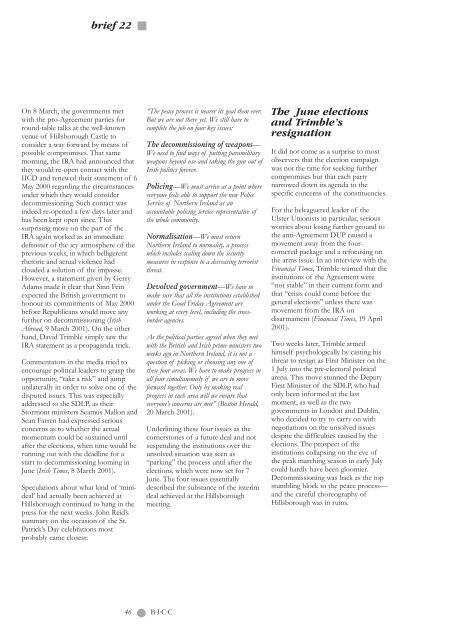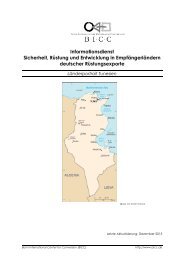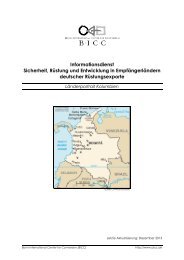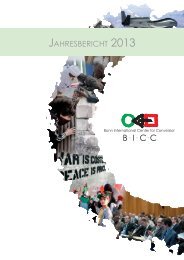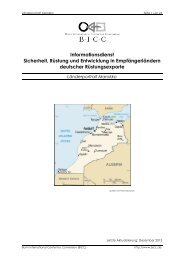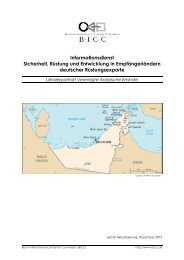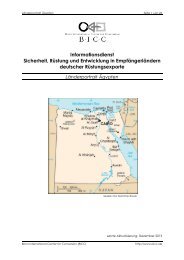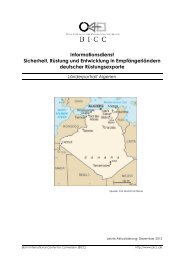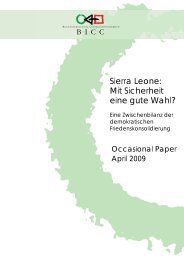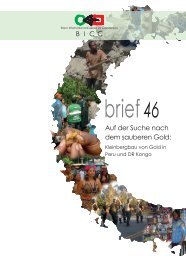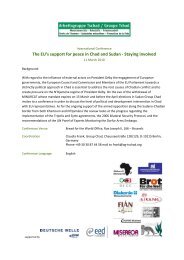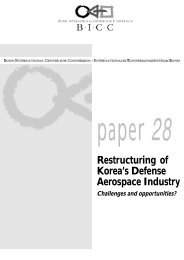English - BICC
English - BICC
English - BICC
You also want an ePaper? Increase the reach of your titles
YUMPU automatically turns print PDFs into web optimized ePapers that Google loves.
ief 22<br />
On 8 March, the governments met<br />
with the pro-Agreement parties for<br />
round-table talks at the well-known<br />
venue of Hillsborough Castle to<br />
consider a way forward by means of<br />
possible compromises. That same<br />
morning, the IRA had announced that<br />
they would re-open contact with the<br />
IICD and renewed their statement of 6<br />
May 2000 regarding the circumstances<br />
under which they would consider<br />
decommissioning. Such contact was<br />
indeed re-opened a few days later and<br />
has been kept open since. This<br />
surprising move on the part of the<br />
IRA again worked as an immediate<br />
defroster of the icy atmosphere of the<br />
previous weeks, in which belligerent<br />
rhetoric and actual violence had<br />
clouded a solution of the impasse.<br />
However, a statement given by Gerry<br />
Adams made it clear that Sinn Fein<br />
expected the British government to<br />
honour its commitments of May 2000<br />
before Republicans would move any<br />
further on decommissioning (Irish<br />
Abroad, 9 March 2001). On the other<br />
hand, David Trimble simply saw the<br />
IRA statement as a propaganda trick.<br />
Commentators in the media tried to<br />
encourage political leaders to grasp the<br />
opportunity, “take a risk” and jump<br />
unilaterally in order to solve one of the<br />
disputed issues. This was especially<br />
addressed to the SDLP, as their<br />
Stormont ministers Seamus Mallon and<br />
Sean Farren had expressed serious<br />
concerns as to whether the actual<br />
momentum could be sustained until<br />
after the elections, when time would be<br />
running out with the deadline for a<br />
start to decommissioning looming in<br />
June (Irish Times, 8 March 2001).<br />
Speculations about what kind of ‘minideal’<br />
had actually been achieved at<br />
Hillsborough continued to hang in the<br />
press for the next weeks. John Reid’s<br />
summary on the occasion of the St.<br />
Patrick’s Day celebrations most<br />
probably came closest:<br />
“The peace process is nearer its goal than ever.<br />
But we are not there yet. We still have to<br />
complete the job on four key issues:<br />
The decommissioning of weapons—<br />
We need to find ways of putting paramilitary<br />
weapons beyond use and taking the gun out of<br />
Irish politics forever.<br />
Policing—We must arrive at a point where<br />
everyone feels able to support the new Police<br />
Service of Northern Ireland as an<br />
accountable policing service representative of<br />
the whole community.<br />
Normalisation—We must return<br />
Northern Ireland to normality, a process<br />
which includes scaling down the security<br />
measures in response to a decreasing terrorist<br />
threat.<br />
Devolved government—We have to<br />
make sure that all the institutions established<br />
under the Good Friday Agreement are<br />
working at every level, including the crossborder<br />
agencies.<br />
As the political parties agreed when they met<br />
with the British and Irish prime ministers two<br />
weeks ago in Northern Ireland, it is not a<br />
question of picking or choosing any one of<br />
these four areas. We have to make progress in<br />
all four simultaneously if we are to move<br />
forward together. Only by making real<br />
progress in each area will we ensure that<br />
everyone’s concerns are met” (Boston Herald,<br />
20 March 2001).<br />
Underlining these four issues as the<br />
cornerstones of a future deal and not<br />
suspending the institutions over the<br />
unsolved situation was seen as<br />
“parking” the process until after the<br />
elections, which were now set for 7<br />
June. The four issues essentially<br />
described the substance of the interim<br />
deal achieved at the Hillsborough<br />
meeting.<br />
46 B·I·C·C<br />
The June elections<br />
and Trimble’s<br />
resignation<br />
It did not come as a surprise to most<br />
observers that the election campaign<br />
was not the time for seeking further<br />
compromises but that each party<br />
narrowed down its agenda to the<br />
specific concerns of the constituencies.<br />
For the beleaguered leader of the<br />
Ulster Unionists in particular, serious<br />
worries about losing further ground to<br />
the anti-Agreement DUP caused a<br />
movement away from the fourcornered<br />
package and a refocusing on<br />
the arms issue. In an interview with the<br />
Financial Times, Trimble warned that the<br />
institutions of the Agreement were<br />
“not stable” in their current form and<br />
that “crisis could come before the<br />
general elections” unless there was<br />
movement from the IRA on<br />
disarmament (Financial Times, 19 April<br />
2001).<br />
Two weeks later, Trimble armed<br />
himself psychologically by casting his<br />
threat to resign as First Minister on the<br />
1 July into the pre-electoral political<br />
arena. This move stunned the Deputy<br />
First Minister of the SDLP, who had<br />
only been informed at the last<br />
moment, as well as the two<br />
governments in London and Dublin,<br />
who decided to try to carry on with<br />
negotiations on the unsolved issues<br />
despite the difficulties caused by the<br />
elections. The prospect of the<br />
institutions collapsing on the eve of<br />
the peak marching season in early July<br />
could hardly have been gloomier.<br />
Decommissioning was back as the top<br />
stumbling block to the peace process—<br />
and the careful choreography of<br />
Hillsborough was in ruins.


